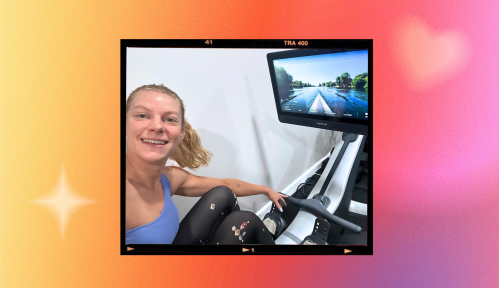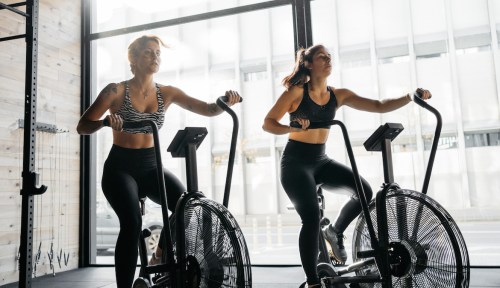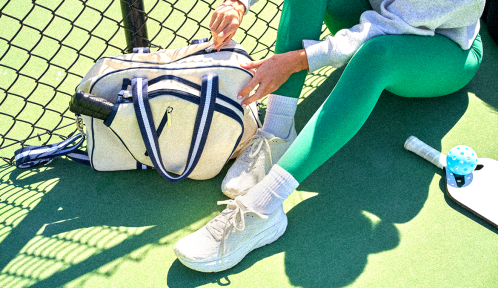I’m sure by now that you’ve heard of, seen or perhaps even own a Theragun or some offshoot of it made by a different company, generally referred to as “massage guns.” These recovery tools were initially the domain of elite athletes (as new devices tend to be expensive, and money is a small price to pay for a potential competitive advantage) but have slowly filtered out into the general public.
Experts in This Article
owner of Quantum Performance and works with the NBA’s Brooklyn Nets
But what do they do, and are they actually effective? A new systematic review of the research on massage guns may hold some answers.
How massage guns work
“These ‘massage guns’ are a form of what’s called percussive treatment, which delivers mechanical vibration—in this case the head of the massage gun delivering repeated contacts—to muscles or tendons,” says physical therapist Andy Barr, DPT
If you’ve ever had a massage where the masseuse uses a cupped hand technique with quick, repeated contacts (this is called “tapotement massage”), it’s the same principle. You may be surprised to learn that percussive treatment delivered through an instrument was first invented in the 1950s!
Dr. Barr, who works with elite athletes and has been in the professional sports health and performance space for over 25 years, has recently seen a stark increase in the use of massage guns.
“I’m a Former Competitive Rower, and the Hydrow Rower Healed my Complicated Relationship with Indoor Rowing.”

Low Impact, High Reward: Why the Assault Air Bike is the Ultimate Cardio Workout You Should Definitely Try

Butter Yellow Is Taking Our Closets By Storm—Here’s How To Add It To Your Workout Wardrobe

“Whether it’s for player recovery or if it’s for performance—to complement a warm-up prior to the game or keep players ‘warm’ while they’re resting—many teams and players use these massage guns constantly. The continued development and portability of the tool have made it even easier to use.”
The latter point has made the use of massage guns viable for large swaths of the population as well: The yearly revenue on massage guns is reportedly over 550 million dollars and growing.
Should you use one? It depends on your goals
The research on the effectiveness of massage guns up to this point had been relatively mixed, but that tends to be the case with any new device. However, there was a new high-quality systematic review released that reviewed multiple studies looking at the impact of massage guns on pain and athletic performance.
The results were quite interesting across multiple domains. The systematic review—which looked at 13 different papers—found that use of a massage gun resulted in improving multiple aspects of athletic performance along with recovery as well.
Specifically, a single use of a massage gun resulted in increasing muscle strength (particularly in the upper body) and increasing explosive muscle strength (think fast, powerful movements like sprinting). With multiple and consistent uses of a massage gun, the study found that muscular pain can be reduced as well, especially for decreasing delayed onset muscle soreness (DOMS) 48 hours after challenging workouts.
Interestingly, the study further found that the use of a massage gun had no overt change on flexibility. But the majority of studies that found a decrease in pain also found an improvement in flexibility, so there may be some nebulous connection there!
Based on this new, promising evidence, how should you be using a massage gun to optimize your recovery and athletic performance? For recovery and reducing pain, use the massage gun consistently after exercise and/or athletic competitions, up to 72 hours post activity. For athletic performance, use the massage gun immediately prior to the activity, whether it’s strength training or athletic activities.
Bear in mind: If flexibility is your main objective, a massage gun isn’t the best use of your time. The best research-driven method there continues to be dynamic stretching and eccentric strength training.
Sign up for the Well+Good SHOP Newsletter
Get exclusive deals on wellness, beauty, fitness, and food products that have been hand-picked by our editors.
Got it, you've been added to our email list.








